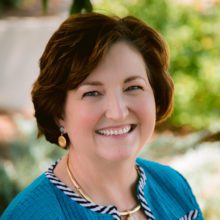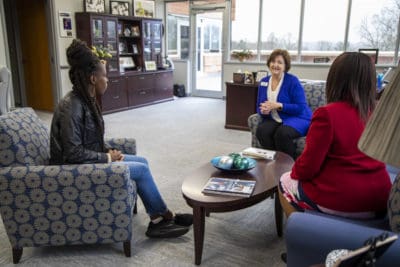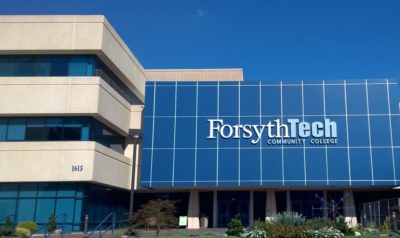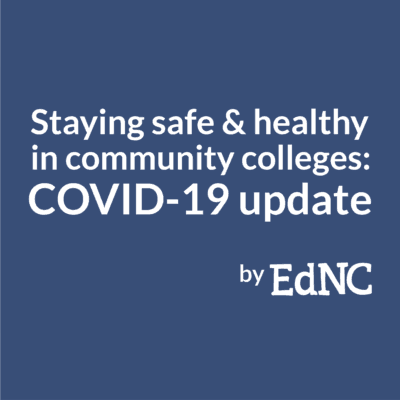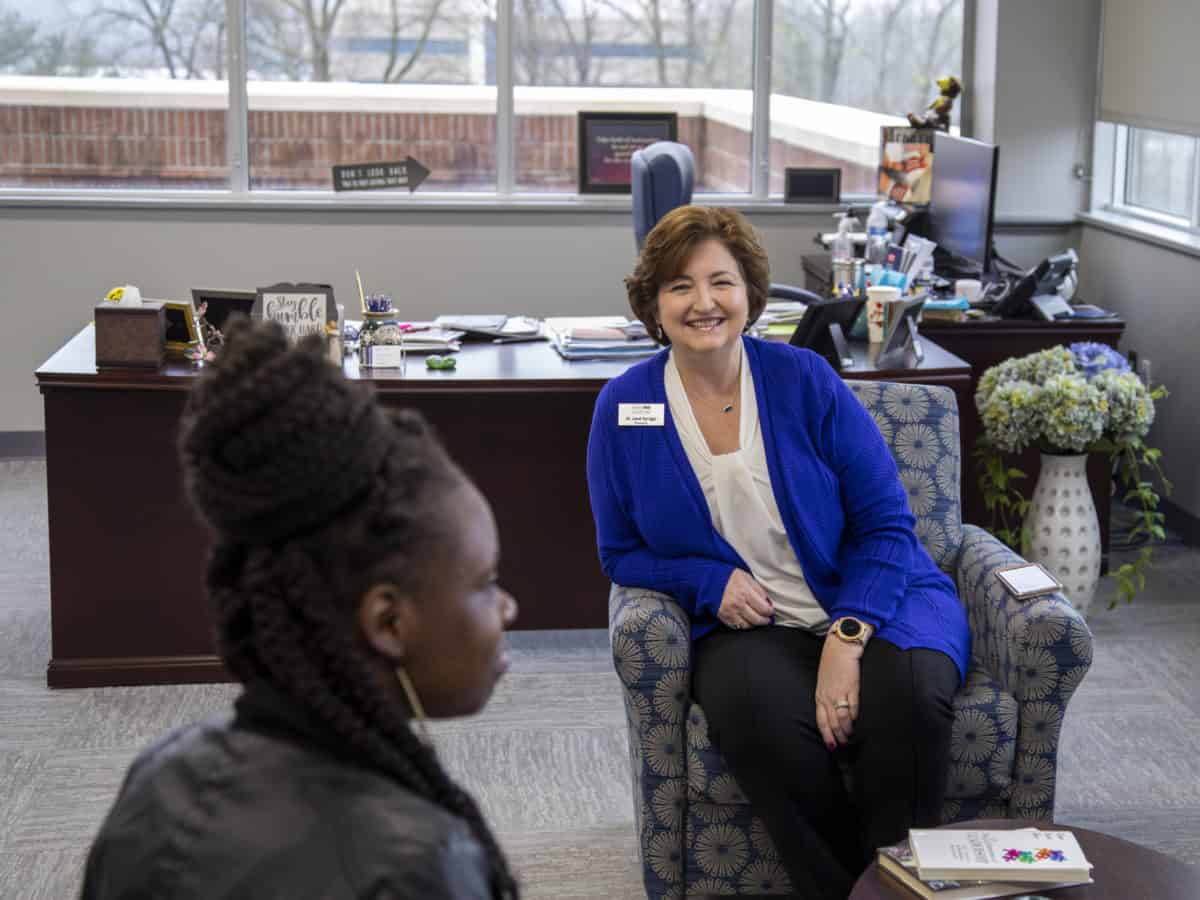

In January, when I began my second year as president of Forsyth Technical Community College, I never imagined how the coming months would unfold. Obviously, we were all watching the evolving situation with the novel coronavirus, COVID-19, but I don’t think any of us anticipated how quickly and dramatically all our lives would change.
I am reminded of poet Robert Burns’ famous line, “the best laid plans of mice and men often go awry.” No matter how much we plan, things we don’t expect and don’t anticipate often change those plans. This was certainly not what we envisioned for our spring semester, but it was, so to speak, the hand we had been dealt, and therefore the hand we would have to play.
Looking back, I think I will always see March 13, 2020 as a pivotal moment. An auspicious Friday the 13th and the day our world shifted in my mind from what we think of as “normal” to something new and different. Something uncertain and unknown.
At Forsyth Tech in the days before this, our minds had been focused on the following week when students would be enjoying spring break and staff and faculty would come together for our annual All Team Day. That was supposed to be a time for us to recharge and prepare for all the end-of-year activities leading up to the biggest day of the year for us — commencement.
This year is particularly special because Forsyth Tech began in 1960 and we had plans to kick-off our 60th anniversary at All Team Day. Unfortunately, as that week progressed, it became increasingly clear we were rapidly moving towards a new kind of reality — into a time where everything was going to be anything but normal and certainly nothing like what we had planned.
Like many colleges, we had engaged our emergency operations team and they were meeting daily to evaluate the emerging situation and help us think through next steps. It was becoming readily apparent that we would not be able to finish the semester normally. We quickly established a primary goal: to keep our students, faculty, and staff safe. Secondly, we pledged to do whatever it took to continue to serve our students and our communities with excellence. We decided the best way to meet those goals would be to find a way for our students to pause while faculty and staff set about building our brave new normal.
As the president, I knew that my leadership team and I needed to empower, inspire, and lead boldly. We were inspired by a great leader who carried an entire nation through crisis during the second World War — Winston Churchill said, “It would be foolish to disguise the gravity of the hour. It would still be more foolish to lose hope and courage.”
We committed to be bold and to lead calmly, confidently, courageously, and compassionately.
Our spring break was scheduled for the next week, but we took the unprecedented step of expanding the break for students, giving them two whole weeks off. During the two-week break, our staff and faculty accomplished more than I ever imagined was possible. They moved 95% of our courses to entirely online and transformed our business operations and student success support services into remote-ready, fully functioning and exceptional “service at-a-distance.” I have to say, I am still not sure how they did what they did in such a short amount of time, while at the same time braving a pandemic that was affecting them personally in sometimes overwhelming ways, but I am forever grateful to them and extremely proud.
We quickly acknowledged the imperative for maintaining an institutional focus on equity — moving to online or remote learning is absolutely an equity issue for our students. Not all students perform well “at-a-distance” and many of our students do not have access to computers or the internet from home. In fact, a great number of our students already enrolled in online classes depended on our computers or our Wi-Fi access to be able to complete their coursework. We also knew that many students were facing additional financial burdens due to job loss, not to mention how many were now homeschooling their children while also trying to go to school themselves.
An equity lens was the impetus behind the creation and launch of Forsyth Tech Cares, an initiative we designed to quickly and seamlessly provide whatever emergency assistance we could to meet the needs of our students, and to also support the needs of faculty and staff. Forsyth Tech Cares was designed to be both a proactive way to connect with students during an emotionally trying time, as well as a reactive way for students to tell us what they needed. Whether it was access to a computer and the internet, a financial emergency, or food, we wanted to know what students needed so we could find a way to help. We also sought out key partnerships like that with the Winston-Salem Forsyth County Schools to offer free meals for students.
COVID-19 did not come with a leadership playbook to help guide our decision making, and strategic thinking and transformational leadership are difficult under every day, “normal” circumstances. This pandemic has taught me a very important lesson about empowered servant leadership, with two perfect illustrations aligned with the starting point of our work to create a brave new normal.
First, we came together to figure out how to quickly deliver teaching and learning and student success services remotely, without sacrificing quality or service excellence. Second, we came together to stand up Forsyth Tech Cares. As crisis situations often do, this pandemic brought our Forsyth Tech family together to fight a common enemy. It empowered us to remove structural and systemic barriers that prevail under normal circumstances, yet don’t seem so important when lives are at risk. We were focused on a high-stakes shared purpose, but even more importantly in my mind, we were stronger together and able to deliver exceptional results because we were empowered to focus first and foremost on serving our students and each other.
As classes resumed remotely on March 30, we were there to answer the phones and emails, and responded to every request submitted through Forsyth Tech Cares. Our students dove back into classes remotely and were thrilled to see videos and live sessions from their instructors. We recognized how critically important consistent communication becomes when so many things are abnormal, so we gave updates and answered questions often and across multiple platforms — we sent emails and text messages, we answered questions on social media and I am even continuing to share Facebook Live discussions every week.
We assured students that we may not be with them in person, but nonetheless, we are still here for them. Above all else, we cared about each other.
Ralph Waldo Emerson said, “Do the thing we fear, and death of fear is certain.”
I have found this to be true in my life many times. Fear can be paralyzing. Of course, there are times when fear is justified and we are rightfully afraid, but I have also found, fear of what will happen is often much worse than the actual result. We are all struggling with being anxious about how this crisis will end and what the future will be like, but I am so very proud of the way we have faced this situation calmly, confidently, courageously and compassionately.
April is national community college month. While sometimes it seems like celebrating these things is not significant, especially at a time like this, I would argue the way we continue to battle this virus is to stand together and not forget what makes us who we are. This crisis has shown me we truly understand what the “community” in our name means.
Community colleges are in the business of hope and opportunity and that has never been more evident than it is right now. During the past month, I’ve seen demonstrations of incredible care, compassion, and courage. I have talked with students who could have dropped out because they faced incredible obstacles, but because of the work we have done together, they still have hope and they are persevering.
We have moved mountains — transforming teaching, learning, and service in ways that I never imagined possible, especially from a distance. We have shared our health technology’s masks and gloves with our community to help keep workers on the front lines of this virus safe, and we have eagerly partnered with our school system to make sure students don’t go hungry. It is my hope when we return to campus, our “brave new normal” will continue. I believe, out of the greatest of crises, when hope seems lost, the most profound opportunities often arise.
In all my messages to students, faculty and staff, I emphasize that we will get through this together, and I tell them that I believe we will be stronger on the other side of this COVID-19 storm. After all, “life isn’t about waiting for the storm to pass, it’s about learning to dance in the rain.” At Forsyth Tech, and at all the 57 other North Carolina Community Colleges, the coronavirus caused us to bravely learn how to dance in the rain.
We will make it through this storm and I predict we will find a beautiful rainbow on the other side.
Until we do, we will remain Forsyth Tech Strong and 58Strong. We will stay hopeful and optimistic, and to paraphrase Dr. Martin Luther King, Jr., we will accept finite disappointment with the hand we have been dealt, but we will never lose infinite hope.
